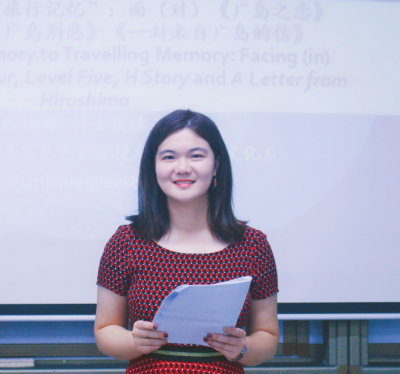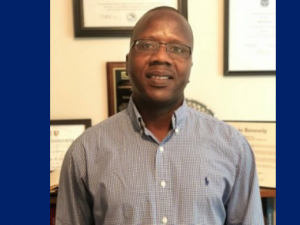AMES Postdoc Looks Beyond the Nation State to Underscore the Joint History of East Asia

The Department of Asian and Middle Eastern Studies (AMES) welcomes Linshan Jiang, postdoctoral associate in Chinese cultural studies, to its faculty for the academic year.
Jiang holds a Ph.D. in East Asian languages and cultural studies from the University of California, Santa Barbara (UCSB). Along with teaching three courses, she will take part in scholarly events and activities, conduct research and work on her publication portfolio.
Her primary research interests are modern and contemporary literature, film and popular culture in mainland China, Taiwan and Japan.
Jiang is also interested in trauma and memory studies, gender and sexuality studies, queer studies and comparative literature and translation studies.
“Jiang belongs to a new generation of scholars who look beyond the nation state and underscore the joint history of East Asia,” explains Shai Ginsberg, chair and associate professor of the department.
“Researching women during and in the aftermath war—where scholarship has commonly dealt with men—she shows us not only how the experiences are different from what we commonly understand about war, but also what these women share, even if they belong to opposing camps.”
“Jiang reinforces the AMES focus on post-WWII culture, regional studies and women’s study, and we’re truly fortunate to have her here.”
What will your research focus on while at Duke?
My primary research project will focus on the war experiences and the memories of women writers during the Asia-Pacific War, including Hayashi Fumiko, Yoshiya Nobuko, Xie Bingying, Nieh Hualing and Zhang Ling. While at Duke, I’ll continue with this project and turn my doctoral dissertation into a book: “Women Writing War Memories.”
I also have a second research project that will explore how queerness is performed in the Sinophone queer cultural productions. I’ve published articles about gender studies and queer studies in literature and culture, as well as translations of scholarly and popular works in Chinese and English.
Why are you drawn to your research?
While earning my M.A., I was fascinated by the writer Pai Hsien-yung’s short story collection, “Taipei People,” which is about Chinese mainlanders displaced in Taiwan due to the Chinese Civil War. This story collection highlights the individual voices in the grand historical narrative of the war.
When I entered my Ph.D. program, I chose to focus on the Second Sino-Japanese War, or the Asia-Pacific War, because of my interest in modern Japanese literature and culture. My research aims to uncover the marginalized voices, especially of women, in the overwhelmingly nationalist and masculine narratives of the war.
I was also drawn by Pai Hsien-yung’s novel, “Crystal Boys,” which concerns the gay community in Taiwan in the 1970s, when homosexuality was still taboo in society.
I took many courses in gender studies and queer studies at UCSB, which led to a self-reflection on my life journey as well. I feel strongly empowered by the idea of queer and how queerness can be related to the concept of gender and sexuality. This is when I started my second research project.
Why did you choose Duke?
I am attracted by the excellent faculty and the research strengths at Duke. During the fall semester, I co-organized an academic event with Carlos Rojas, professor of Asian and Middle Eastern studies, and a parallel event at UNC Chapel Hill.
I enjoy the vibrant atmosphere in the Research Triangle area, and I am looking forward to more academic events coming up in the spring semester supported by AMES.
I also want to emphasize the rich resources at Duke University Libraries. During the fall semester, I cooperated with the Chinese studies librarian, Luo Zhou, who offered one visual archive session for my course. I am so excited about our further collaboration this semester.




